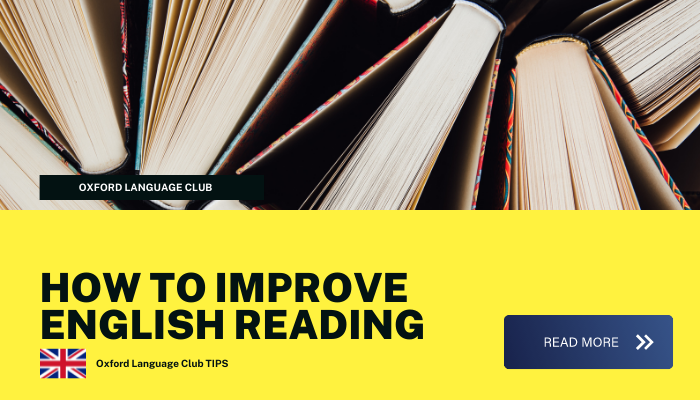Great site to keep my english skills updated for work and travel. I am really enjoying the lessons!
Maria C
 Argentina
Argentina


Did you read anything in English this past week?
How much of it did you understand?
“Reading comprehension” refers to how much you understand of what you read. Even if you read an English book every week, it doesn’t help your learning much if you don’t know what the words on the pages are saying.
So you may be wondering how to improve English reading beyond just… reading more books.
That’s exactly what we’ll discuss in this article.
We will help you learn English reading with smart strategies. You’ll discover exactly how to read English books in a way that will actually improve your skills.
Is Reading English Hard? How to Improve English Reading with 8 Easy Steps
1. Always Make Special Time to Read
Reading for fun can be done anywhere. You could take a fun book out on a bus, in bed or at the office, and you can enjoy it.
However, if you’re reading to improve your comprehension, you need to focus and study.
This means you need to make a special time for this reading. Making time for your reading will let you focus well without risk of being interrupted. This time should be quiet, and you should avoid being distracted.
You should try to spend at least 30 minutes every day on focused reading. That’s how to improve your reading skills seriously and successfully. The more you read, the more you’ll improve.
Try this:
Turn your reading process into a ritual, something you repeat every time you sit down to focus on reading English.
Follow these steps, or any other steps that you’d like to make a part of your reading process:
Turning off the sound on your electronics might not seem important, but it’s something you really must do!
If you have a specific process for preparing to read, then your brain will know when you’re about to read and you’ll be more focused before you even start.

2. Read the Right Books
The Martian: A NovelIf you dislike science fiction, you might not want to read a book about a man stuck on Mars. When you’re choosing books (and other texts) to read, keep two things in mind:
1. What you’re interested in
2. Your reading level
Whenever you can, you should read things that you enjoy. You should also choose books that are at an English level just above the one you’re most comfortable with. You want to challenge yourself just enough to learn new things, but not enough to get frustrated with your reading.
3. Ask Yourself Questions While Reading and After Reading
Learning how to read English books is about more than just reading the words!
There are a few things you can do before, during and after reading to help you better understand the text.
Before you read, browse the text. That means you should look over the text quickly without actually reading every word.
Take some time after you read too, to browse again and summarize what you remember. Try to quickly say or write a few sentences that describe what the text was about.
Thinking about what you read will show you how much of it you really understood, and help you figure out if you still have questions.
4. Improve Fluency First
Reading. Is. Fun.
Do you notice how you stopped every time you saw the period?
Now imagine reading an entire article or even book like this, stopping after every word. It would be difficult to understand, wouldn’t it?
It’s hard to form an understanding of what you’re reading when you read word-by-word instead of in full sentences. That’s why, to improve your understanding, it’s important to improve your fluency first.
Fluency is how smoothly you can read. When you read in your head, you should have a certain rhythm to the words. The words should flow together naturally, like when somebody is talking. That’s how to read English books like a native speaker would.
Improving fluency can be as simple as choosing slightly easier texts to read, or it might take some time and practice. If you take some time to improve how fluently you read, though, it will help you in the future. You’ll improve your reading and even your speaking. It will also make reading feel more fun and natural.
5. Once You’ve Learned to Speed Up, Slow Down!
After you learn English reading more fluently, you can stop worrying about your speed and start thinking about the text and its meaning.
That’s right, now that you can read fast, it’s time to read slowly. Take time to really get into the text you’re reading, instead of speeding through it.
Try this:
One great way to slow yourself down is to read out loud. Not only will you be practicing your reading and understanding, but also your pronunciation, listening and speaking. Focus on speaking every word carefully and pronouncing it well.
If you can’t (or don’t want to) read out loud, you can try pausing every few paragraphs to make sure you’re paying attention.
Another way to pace yourself well is by making notes and writing down questions as you read.
6. Ask Lots of Questions
Speaking of questions—ask them. Ask a lot of them! The more you question what you read, the deeper you get into the meaning.
Asking questions is also a good way to make sure you understand what you’re reading. Asking questions like “what’s happening now?” or “who’s speaking here?” can help keep you focused. Asking questions like “why did he do that?” or “what is she thinking?” can help you think deeper into the story.
7. Read It Again
The poet Ezra Pound says that with books, “no reader ever read anything the first time he saw it.”
Sometimes reading a text just once isn’t enough to understand it. This is true if you’re reading something difficult, or even if you’re not—reading something more than once can help you understand it much better.
Re-reading is great for those times when you read the words but can’t get them to make sense. It’s also great for finding things you might have missed the first time. If there are any new words in the text, you’ll see them again every time your read again, helping you remember them.
In short, reading things again is great!
8. Read Many Kinds of Texts
Today we don’t just read books and newspapers. We read blogs, emails, Tweets and texts. The more you read anything in English, the better you’ll get at the language.
Don’t just read books and news. Read anything and everything! Find a magazine that you enjoy, follow some interesting people or websites on Facebook, or visit a blog you like reading.